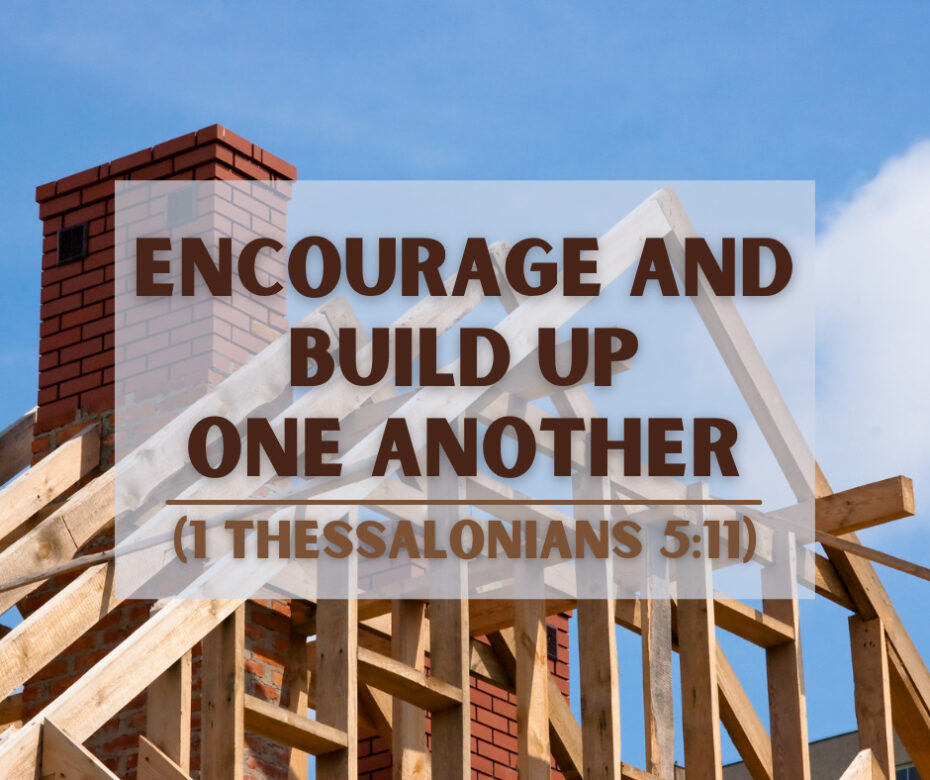My wife and I bought our house in 2015. It’s our first house. Up till then, we rented—living in apartments and townhomes where we were restricted on what we could do to make the space our own and depending on the landlord to make repairs. Now things are different. The responsibility of maintaining the house is ours. It was in good shape when we bought it, but it was aging. Like most homeowners, we continually make repairs or improvements to make our home a little better than when we first moved in. Painting here. Patching up there. Replacing the roof after a destructive hailstorm. Fixing a slab leak. Replacing a cracked heater. I’m grateful for the builders and plumbers and roofers and technicians we hired to do the work. I’m also thankful for industrious grandparents who have come to fix a fence or to secure a dishwasher. Though our house was built in 2001, it still needs to be built up.
Paul knew something about repairs and renovations:
Therefore, encourage one another and build one another up, just as you also are doing (1 Thess 5:11 nasb).
Encourage and build. “Paul is very fond of this idea of the building up of Christians,” Leon Morris noted. “The word he uses is properly applicable to such matters as building houses, but Paul habitually uses it metaphorically, of the building up of Christians in the faith” (Morris, Thessalonians, p. 163).
Every Christian needs building up.
In our position, we are complete in Christ (Col 2:9-10). But in our experience—in our day-to-day living and growing in Jesus—we’re all under different stages of construction. Some of us just poured the foundations. Others are building a fourth or fifth floor.
Furthermore, we come to the church in different stages of disrepair, worn out by the hailstorms and water damage of life. Paul is saying we need Christian community to build us up and repair us where we need it.
Think of it this way. In my case, I am not a handyman. I do ok fixing washing machines and dishwashers, but I cannot fix a slab leak or repair a roof. I hire other people to help fix what needs fixing. Something similar is true of building up your spiritual life. You need help doing it. That’s why you have experienced and multi-gifted people within the church to do the building up for you.
The immediate context for Paul’s exhortation was the worry the Thessalonians had about what would happen to believers who died before the Lord’s return in the Rapture. Paul comforted them by revealing that the dead would not lose out but would be raised first (1 Thess 4:16), so the living and the dead would both meet Christ together.
Paul was providing them with doctrinal comfort. Morris explains that encouraging means “strengthening by one’s words” (p. 163). Words can build up—especially doctrine, which renews the mind. Indeed, as I. Howard Marshall says, Paul specifically refers to “strengthening faith so that believers will not succumb to temptation to lose heart or slip into spiritual carelessness (Marshall, 1 and 2 Thessalonians, p. 141). We need to build each other up, not in the sense of personal self-esteem (e.g., “You’re having such a great hair day!”), but in our faith. How often have our conversations just stayed on the surface of life, without ever breaking through to the real hurts, worries, pains, and fears of our particular situations? I find it challenging to get to those honest moments, even among Christians, but it can happen given the right context (usually around a meal, or over a long trip). We need to be mindful of creating opportunities where honest conversation can happen so that doctrinal edification can happen.
So what does this “one another” command mean? It means the normal Christian church life is one where the believing community should unashamedly speak the truths of the faith to the situations of the faithful. That requires getting beyond Sunday morning pleasantries, to talking about the deep things of the faith, such as the Rapture and Resurrection.
And in the context of 1 Thessalonians, it means the normal Christian community should be one that is shaped by an eager expectation for the coming of the Lord. As Walvoord and Hitchcock say, “may it not only be part of our theology and our hope, but may it be the mainspring of our Christian life and testimony” (Walvoord and Hitchcock, 1&2 Thessalonians, p. 96).


